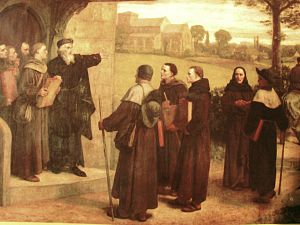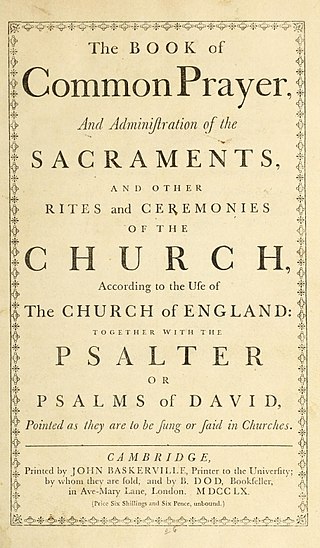
The Book of Common Prayer (BCP) is the name given to a number of related prayer books used in the Anglican Communion and by other Christian churches historically related to Anglicanism. The first prayer book, published in 1549 in the reign of King Edward VI of England, was a product of the English Reformation following the break with Rome. The work of 1549 was the first prayer book to include the complete forms of service for daily and Sunday worship in English. It contained Morning Prayer, Evening Prayer, the Litany, and Holy Communion and also the occasional services in full: the orders for Baptism, Confirmation, Marriage, "prayers to be said with the sick", and a funeral service. It also set out in full the "propers" : the introits, collects, and epistle and gospel readings for the Sunday service of Holy Communion. Old Testament and New Testament readings for daily prayer were specified in tabular format as were the Psalms and canticles, mostly biblical, that were provided to be said or sung between the readings.

A creed, also known as a confession of faith, a symbol, or a statement of faith, is a statement of the shared beliefs of a community in a form which is structured by subjects which summarize its core tenets.
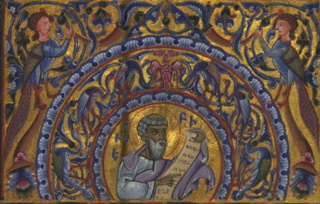
Eusebius of Caesarea, also known as Eusebius Pamphilus, was a Greek Syro-Palestinian historian of Christianity, exegete, and Christian polemicist. In about AD 314 he became the bishop of Caesarea Maritima in the Roman province of Syria Palaestina. Together with Pamphilus, he was a scholar of the biblical canon and is regarded as one of the most learned Christians during late antiquity. He wrote Demonstrations of the Gospel, Preparations for the Gospel and On Discrepancies between the Gospels, studies of the biblical text. As "Father of Church History", he produced the Ecclesiastical History, On the Life of Pamphilus, the Chronicle and On the Martyrs. He also produced a biographical work on Constantine the Great, the first Christian Roman emperor, who was Augustus between AD 306 and AD 337.

Girolamo Savonarola, OP or Jerome Savonarola was an ascetic Dominican friar from Ferrara and a preacher active in Renaissance Florence. He became known for his prophecies of civic glory, his advocacy of the destruction of secular art and culture, and his calls for Christian renewal. He denounced clerical corruption, despotic rule, and the exploitation of the poor.
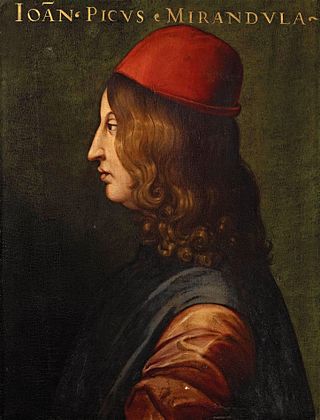
Giovanni Pico dei conti della Mirandola e della Concordia, known as Pico della Mirandola, was an Italian Renaissance nobleman and philosopher. He is famed for the events of 1486, when, at the age of 23, he proposed to defend 900 theses on religion, philosophy, natural philosophy, and magic against all comers, for which he wrote the Oration on the Dignity of Man, which has been called the "Manifesto of the Renaissance", and a key text of Renaissance humanism and of what has been called the "Hermetic Reformation". He was the founder of the tradition of Christian Kabbalah, a key tenet of early modern Western esotericism. The 900 Theses was the first printed book to be universally banned by the Church. Pico is sometimes seen as a proto-Protestant, because his 900 theses anticipated many Protestant views.

A catechism is a summary or exposition of doctrine and serves as a learning introduction to the Sacraments traditionally used in catechesis, or Christian religious teaching of children and adult converts. Catechisms are doctrinal manuals – often in the form of questions followed by answers to be memorised – a format that has been used in non-religious or secular contexts as well. According to Norman DeWitt, the early Christians appropriated this practice from the Epicureans, a school whose founder Epicurus had instructed to keep summaries of the teachings for easy learning. The term catechumen refers to the designated recipient of the catechetical work or instruction. In the Catholic Church, catechumens are those who are preparing to receive the Sacrament of Baptism. Traditionally, they would be placed separately during Holy Mass from those who had been baptized, and would be dismissed from the liturgical assembly before the Profession of Faith and General Intercessions.

William Edward Hartpole Lecky, was an Irish historian, essayist, and political theorist with Whig proclivities. His major work was an eight-volume History of England during the Eighteenth Century.
The Apostolic Fathers, also known as the Ante-Nicene Fathers, were core Christian theologians among the Church Fathers who lived in the 1st and 2nd centuries AD who are believed to have personally known some of the Twelve Apostles or to have been significantly influenced by them. Their writings, though widely circulated in early Christianity, were not included in the canon of the New Testament. Many of the writings derive from the same time period and geographical location as other works of early Christian literature which came to be part of the New Testament.
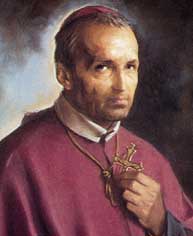
Alphonsus Liguori, CSsR, sometimes called Alphonsus Maria de Liguori or Saint Alphonsus Liguori, was an Italian Catholic bishop, spiritual writer, composer, musician, artist, poet, lawyer, scholastic philosopher, and theologian. He founded the Congregation of the Most Holy Redeemer, known as the Redemptorists, in November 1732.
Protestant Reformers were theologians whose careers, works and actions brought about the Protestant Reformation of the 16th century.

On the Freedom of a Christian, sometimes also called A Treatise on Christian Liberty, was the third of Martin Luther’s major reforming treatises of 1520, appearing after his Address to the Christian Nobility of the German Nation and the work Prelude on the Babylonian Captivity of the Church. The work appeared in a shorter German and a more elaborate Latin form. There is no academic consensus whether the German or the Latin version was written first.

Christian literature is the literary aspect of Christian media, and it constitutes a huge body of extremely varied writing.

Infelix ego is a Latin meditation on the Miserere, Psalm 51, composed in prison by Girolamo Savonarola by 8 May 1498, after he was tortured on the rack, and two weeks before he was burned at the stake in the Piazza della Signoria in Florence on 23 May 1498. The prison authorities had spared only his right arm during the preliminary torture, so that Savonarola would be able to sign his confession: after doing so, and in a state of despair at not being strong enough to resist the pain of his prolonged torture, he wrote Infelix ego and a portion of a companion meditation, Tristitia obsedit me, on Psalm 30. He was executed before he was able to complete Tristitia obsedit me.
Elene is a poem in Old English, that is sometimes known as Saint Helena Finds the True Cross. It was translated from a Latin text and is the longest of Cynewulf's four signed poems. It is the last of six poems appearing in the Vercelli manuscript, which also contains The Fates of the Apostles, Andreas, Soul and Body I, the Homiletic Fragment I and Dream of the Rood. The poem is the first English account of the finding of the Holy Cross by Saint Helena, the mother of Emperor Constantine. The poem was written by Cynewulf some time between 750 and the tenth century. It is written in a West Saxon dialect, but certain Anglianisms and metrical evidence concerning false rhymes suggest it was written in an Anglian rather than Saxon dialect. It is 1,321 lines long.
This is a selected list of works by and about Martin Luther, the German theologian. The emphasis is on English language materials.

The Church History of Eusebius, the bishop of Caesarea, was a 4th-century pioneer work giving a chronological account of the development of Early Christianity from the 1st century to the 4th century. It was written in Koine Greek, and survives also in Latin, Syriac and Armenian manuscripts.

Liberty Fund, Inc. is a nonprofit foundation headquartered in Carmel, Indiana which promulgates the libertarian views of its founder, Pierre F. Goodrich through publishing, conferences, and educational resources. The operating mandate of the Liberty Fund was set forth in an unpublished memo written by Goodrich "to encourage the study of the ideal of a society of free and responsible individuals".

"Herr Gott, dich loben wir" is a Lutheran hymn, which Martin Luther wrote in 1529 as a translation and partial paraphrase of the Latin Te Deum. It is sometimes called the German Te Deum. The hymn was first published in 1529. Its hymn tune, Zahn No. 8652, is a simplification of the melody of the traditional Te Deum. It has appeared in 24 hymnals.
The Reformed systematic theology bibliography lists complete works of systematic theology in the Reformed tradition. Systematic theology is the orderly formulation of Christian doctrines and beliefs. This bibliography includes works which attempt to present a coherent account of all major doctrines of the Reformed faith. Theologians considered by scholars to be in the Reformed tradition are included, even if they are considered to have departed from any particular conception of the Reformed faith.
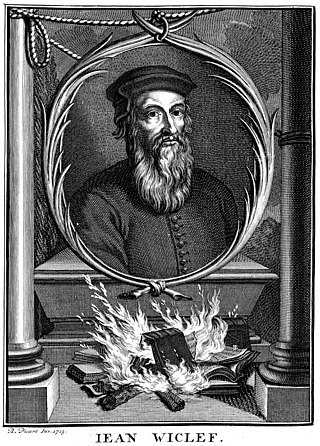
Proto-Protestantism, also called pre-Protestantism, refers to individuals and movements that propagated various ideas later associated with Protestantism before 1517, which historians usually regard as the starting year for the Reformation era. The relationship between medieval sects and Protestantism is an issue that has been debated by historians.













